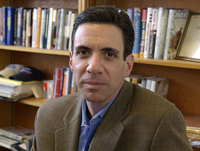Remembering Altman
COM Prof Mitchell Zuckoff on one of America’s most adventurous film directors

The death of the great American film director Robert Altman yesterday at the age of 81 ended the career of one of the most influential and innovative filmmakers in the history of the art form. Altman made more than 40 films, including such classics as MASH, McCabe and Mrs. Miller, and Nashville. When he died, Altman had been working on a memoir with Mitchell Zuckoff, a professor of journalism in the College of Communication. Zuckoff, a former reporter for the Boston Globe and the author of several books, talked to BU Today about Altman’s work, his influence, and his famous indifference to the desires of the industry.
BU Today: What film will Robert Altman be remembered for most?
Zuckoff: That’s a tough one. I think to many people Nashville will always be his masterpiece. He loved the film Images. It’s a film that many people have never seen. The real problem with answering that question is that he loved all of his movies. He would refuse to answer a question like that, but I’d have to say Nashville, The Player, and Short Cuts.
Which of his films is most overlooked by viewers and critics?
Images. Images is his exploration of a woman’s psychological disruption, and it is brilliant. In making it, he stepped into a realm that he had never before entered. He had made films like MASH and McCabe and Mrs. Miller, and to suddenly do such a very European movie, it showed that he could do anything. I’d say the same thing about McCabe and Mrs. Miller. In that film he literally reimagined the Western.
How did Altman’s work shape the direction of other filmmakers?
It did that mainly in its technical aspects. He influenced a lot of filmmakers in the areas of sound and camera movement. He would say that Howard Hawks was the first to use overlapping dialogue, but Altman really brought it to a new level. He would mic everything and run a multitrack audio so you didn’t have just one person speaking at one time. He was trying to capture his own version of life. If he was not the first to do it, he was a major innovator.
The other thing he did was move the camera constantly. The camera was always moving and gave the feeling of motion to scenes that would otherwise have felt quite static. Also, I have to say that as important as he was technically, much of his innovation concerned the ways he exposed character. I mean the ways he explored huge issues, whether it was war in MASH, or a political assassination in Nashville, or corporate greed in The Player. He would set up a situation and allow the actors to explore their craft from inside their characters. At that point he would say his job as a director was to giggle and give in. By giving up a certain amount of control as a director, he ended up getting inside his characters is a way that few directors have even attempted.
What was Altman’s relationship to the industry?
He liked to say that they were selling shoes and he was making gloves. For him, it was two different businesses. They were serving the multitudes. He didn’t want to make a film with a shark in it. That’s not to say he didn’t admire Jaws. He did admire it; he just didn’t want to make it. He simply would not play by their rules. He used to say that the artist and the masses are natural enemies.
Who did he admire?
He really hated that question. If you asked him who he learned from he would say that what he learned was what not to do. He would go to a film and say, “Man, I never want to do that. That was awful.” But who did he admire? Truffaut.
Is there something he wanted to do that he never did?
The only thing he wanted to do was make movies. He was always focused on the next film. The last time I was with him, a couple of weeks ago, he was excited because Meryl Streep had just committed firmly to his next movie. In the broader sense, we would be going through his filmography and if he was in a melancholy mood he would say he felt like that old song “Is that all there is?” I’d say, “You have to be kidding.” But like any truly creative person, the thing he wanted most was the one that got away —the film that didn’t get made. It so tickled him, being on the movie set and planning things and making it happen again and again. He was working right up to the last.
Art Jahnke can be reached at jahnke@bu.edu.